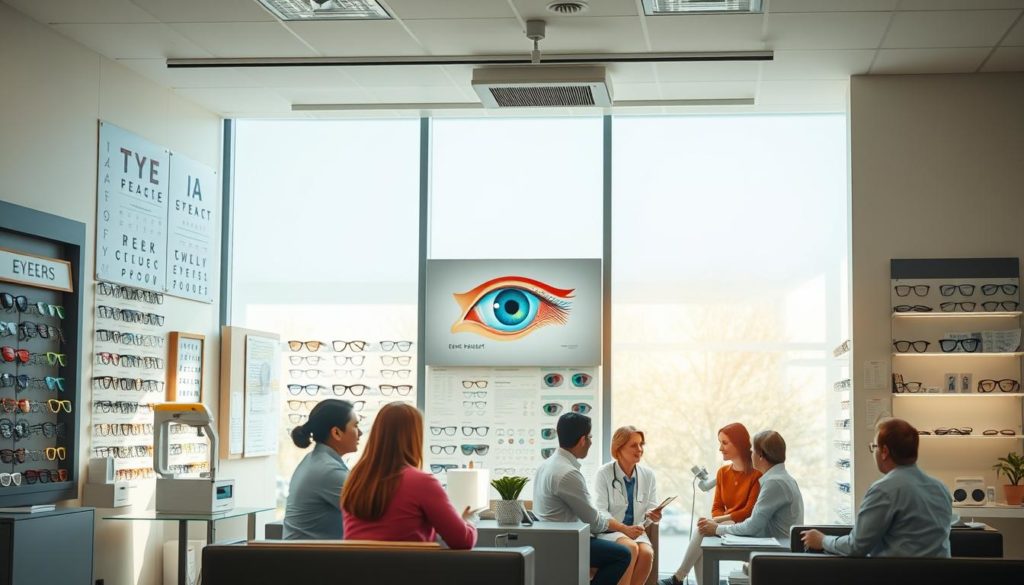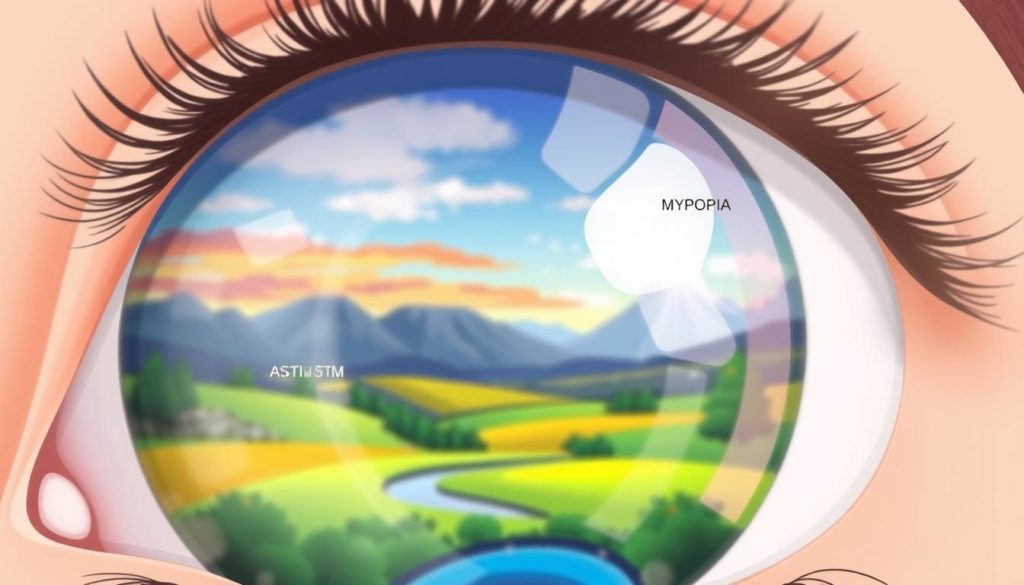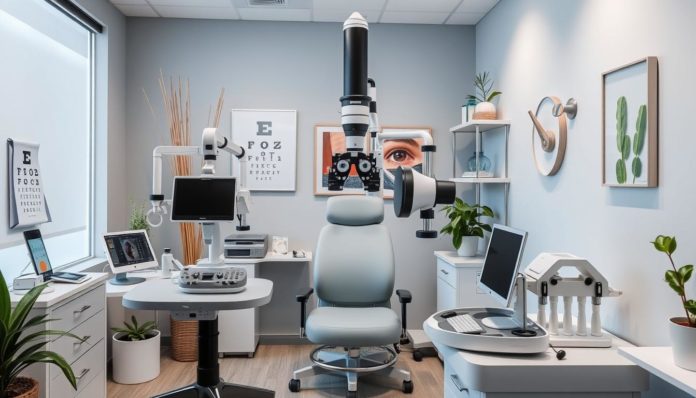Did you know that over 75% of vision loss cases could be prevented? This shows how important it is to care for our eyes early on.
Welcome to our detailed vision care guide. It’s your key tool for keeping your eye health in check. Whether it’s simple vision errors or serious conditions like glaucoma, knowing is the first step towards healthy eyes.
This guide will help you identify vision problems and understand the latest treatments available. We’ll also share healthy eye tips. Join us as we aim for clearer, healthier vision.
Introduction to Vision Health and Care
Understanding vision health is key to staying healthy overall. Our eyes let us see the world, making good eye care important. It’s good to learn eye health basics first to protect your eyes for a long time.
Vision care includes many steps to keep eyes healthy. Getting checked regularly by optometry services finds problems early. These visits help fix vision issues and teach ways to take care of your eyes.

Ophthalmology services are also vital for serious eye conditions. Seeing an ophthalmologist can spot and treat big eye problems early. This stops vision loss or other issues from getting worse.
Adding these key steps to your daily life builds a solid eye health foundation. Knowing vision care basics is essential, whether you’re preventing problems or treating them.
Common Vision Problems and Their Symptoms
It’s very important to know about vision problems to keep your eyes healthy. Your eyes can deal with many issues. These range from simple ones to very serious conditions. Spotting these issues early can help fix and treat them well.
Refractive Errors: Myopia, Hyperopia, Astigmatism
Refractive errors are the most common eye issues. Myopia, or seeing far things as blurry, is common. Meanwhile, hyperopia, or trouble seeing things up close, affects many too.
Astigmatism causes light to scatter instead of focus, making vision blurred or distorted. Glasses, contacts, or surgery can correct these vision problems.

Age-Related Vision Issues: Presbyopia, Cataracts
As we get older, our eyes face different challenges. Presbyopia occurs after 40, making it hard to see things up close. This is because the eye’s lens gets harder.
Cataracts make the lens cloudy, blurring vision. Both issues can disrupt everyday life if not treated.
Serious Eye Conditions: Glaucoma, Diabetic Retinopathy
Some eye problems are very serious. Without quick action, they can cause lasting harm. Glaucoma means higher pressure in the eye that can harm the optic nerve. This might cause vision loss.
Diabetic retinopathy is for people with diabetes. High sugar can hurt the eye’s blood vessels. Getting eye exams early is key to manage these issues and correct vision effectively.
The Importance of Regular Eye Exams
Keeping your eyes healthy is key to your overall health. Regular eye exams are critical for this. They can spot early signs of eye problems and health issues like diabetes or high blood pressure. Here is what a full eye exam includes and the conditions it can help find.
What to Expect During an Eye Exam
A comprehensive eye examination has several tests to check your vision and find any problems. One test checks how sharp your vision is. Another test finds the right prescription for your glasses or contacts. There’s also a detailed check of the front part of your eye for any issues.
Eye exams may include a test where drops are put in your eyes to widen your pupils. This lets the doctor see the retina and optic nerve better. It’s key for spotting problems like retinal detachment or glaucoma early. Sometimes, your eye doctor might suggest more tests based on your health.
Conditions Diagnosed Through Eye Exams
Eye exams are crucial for checking your vision and finding eye problems. They can detect issues like nearsightedness, farsightedness, and astigmatism. These can usually be fixed with glasses, contacts, or other treatment options for vision issues.
They can also find serious problems like glaucoma, diabetic eye disease, and age-related eye issues. Finding these early is key to treating them well. This can save your sight and stop worse problems.
Eye exams can show signs of other health issues too. High blood pressure, high cholesterol, and some cancers can be found through eye changes. This shows why regular eye exams are important for your health routine.
Below is a summary of what regular eye exams entail and the conditions they can help diagnose:
| Eye Exam Components | Conditions Diagnosed |
|---|---|
| Visual Acuity Test | Refractive Errors |
| Refraction Test | Myopia, Hyperopia, Astigmatism |
| Slit-lamp Examination | Cataracts, Corneal Anomalies |
| Dilated Eye Exam | Glaucoma, Retinal Detachment |
| Additional Tests | Diabetic Retinopathy, Macular Degeneration |
Pediatric Vision Care: Specialized Eye Health for Children
Pediatric vision care is key to helping kids see well as they grow. It focuses on children’s special eye health needs. This care comes from experts called pediatric ophthalmologists.
Choosing the Right Pediatric Ophthalmologist
When picking a pediatric ophthalmologist, their experience matters a lot. Look for doctors who work with well-known programs. The Vision Center at Children’s Hospital Los Angeles is a great example because of its wide range of services. Seeing a specialist in kids’ eye health really helps with proper vision development.
Common Childhood Vision Problems
Children often face several types of vision problems. These need to be looked at early.
- Amblyopia (Lazy Eye): This is when the brain prefers one eye, making the other eye’s vision weak.
- Strabismus (Crossed Eyes): This is when the eyes don’t line up right, causing double vision or trouble seeing depth.
- Refractive Errors: These are vision focusing problems like myopia (nearsightedness), hyperopia (farsightedness), and astigmatism.
Getting help early from pediatric ophthalmology programs is important. It can make a big difference in how well a child sees. Catching and treating these issues early is crucial for good eye health.
Diagnosing and Treating Vision Problems
It’s crucial to have regular eye exams to catch vision problems early. Eye care experts use special methods and gear to spot these issues. By finding them early, they can treat them quickly to protect and improve your sight.
Common vision issues include refractive errors like nearsightedness and farsightedness. More serious ones include glaucoma and retinal detachment. Diagnosing these uses advanced tools. For example, doctors might use a slit lamp exam to look closely at your eye’s parts.
There are many ways to treat these vision problems. Glasses and contacts are common for refractive errors. For a more permanent fix, surgeries like LASIK are available. Advanced surgeries and laser treatments are also options for other eye conditions.
For serious eye problems, experts may suggest medicine or surgery. For glaucoma, care might include drugs or surgery to lower eye pressure. Treatments for age-related macular degeneration help maintain life quality for as long as possible.
Finding and treating eye issues early ensures your eyes stay healthy. Regular visits to eye care professionals can keep problems away and protect your vision for the future.
Advancements in Vision Care: New Technologies and Treatments
The field of vision care is changing fast. Many patients now have hope thanks to new treatments. Laser eye surgery and amazing gene therapy are making big leaps forward.
Laser Eye Surgery: LASIK and PRK
LASIK and PRK are leading the way for better eyesight. These methods are quick, not too invasive, and people recover fast. They’re becoming more popular.
LASIK reshapes the cornea with a laser to fix sight issues. PRK does something similar but is often better for certain eye shapes.
| Procedure | Advantages | Recovery Time |
|---|---|---|
| LASIK | Quick recovery, less discomfort | 24 to 48 hours |
| PRK | Suitable for thin corneas, no flap creation | Several days to a week |
Gene Therapy for Retinal Diseases
There’s also exciting news about gene therapy for eye diseases. It’s focused on fixing genetic problems that cause big issues like retinitis pigmentosa. Gene therapy changes bad genes with good ones. It could be a big help for diseases that we couldn’t fix before.
Vision Correction Options: Glasses, Contacts, and Surgery
Vision correction options have grown over the years. Now, individuals can choose from prescription glasses, contact lenses, or eye surgery for better eyesight. Understanding the benefits and details of each option is crucial.
Prescription Glasses: Types and Benefits
Prescription glasses are a common and effective way to correct vision. You can find them in many styles and materials, fitting various needs and tastes. They are easy to use, last a long time, and can be customized.
They also have features like anti-reflective coatings and transitional lenses. To pick the right glasses, know your vision needs, talk to an optician, and consider the lens type and frame style.
Contact Lenses: Choosing the Right Type for You
Contact lenses are a great choice for those who prefer not to wear glasses. They suit active people and offer a look without glasses. There are types of contact lenses like:
- Soft contacts: These are comfortable and easy to get used to. They work well for daily or extended wear.
- Rigid gas-permeable (RGP) lenses: These last long and offer clear vision but need some time to adjust to.
- Toric lenses: These are for people with astigmatism.
Talking to your eye care provider is key to finding the best contact lenses for your needs.
Looking at all the vision correction options helps you choose wisely. Here’s a table that compares the main choices:
| Vision Correction Option | Pros | Cons |
|---|---|---|
| Prescription Glasses |
|
|
| Contact Lenses |
|
|
| Eye Surgery |
|
|
Knowing the differences between these options helps you pick the right one for you. Always talk to eyecare experts to make the best choice for your eyes.
Maintaining Good Vision Health: Tips and Best Practices
To keep your vision sharp, being proactive is key. Here, find easy eye care tips to add to your everyday routine.
- Regular Eye Exams: Have thorough eye checks yearly. It helps catch vision problems early.
- Healthy Diet: Eat foods rich in vitamins and minerals. Favorites include leafy greens, fish with omega-3, and carrots for eye health.
- Protective Eyewear: Wear sunglasses that block all UV rays outside. It protects eyes from sun damage.
- Screen Time Management: Use the 20-20-20 rule. Every 20 minutes, look at something 20 feet away for 20 seconds. It helps avoid eye strain from screens.
- Good Hygiene Practices: Always clean your hands before touching your eyes or contacts. It keeps infections away.
For even better vision health, let’s look at some eye-friendly foods:
| Food | Eye Health Benefit |
|---|---|
| Carrots | Rich in beta-carotene, essential for good vision health. |
| Spinach | Contains lutein and zeaxanthin, protecting against cataracts and macular degeneration. |
| Salmon | Full of omega-3 fatty acids, great for eye health. |
| Eggs | Have lutein, zeaxanthin, and zinc, crucial for healthy eyes. |
| Almonds | Loaded with vitamin E, guarding against macular degeneration. |
By following these vision health tips and eating the right foods, you can protect your eyes for many years. Start these helpful habits today to prioritize your vision.
Eye Care Specialists: Understanding Their Roles
Eye health is very important, and different specialists help keep our eyes healthy. Ophthalmologists, optometrists, and opticians each have a unique job. Knowing which one to visit can help you get the care you need quickly.
Ophthalmologists are doctors who focus on eye care. They can do exams, treat diseases, prescribe medicine, and do surgery. If you have a serious issue like glaucoma, you’ll likely need an ophthalmologist. They have a lot of training, including medical school and residency.
Optometrists mainly do eye exams and prescribe glasses or contacts. They don’t do surgery, but they can treat some eye problems. They play a big role in keeping your vision clear and spotting diseases early.
Opticians are the ones who fit you for glasses or contacts, using prescriptions from ophthalmologists or optometrists. They make sure your eyewear fits well and works for your eyes. All these professionals work together to make sure your eyes are healthy and you can see well.
FAQ
What are the most common vision problems?
Many people have vision problems. These include myopia (nearsightedness) and hyperopia (farsightedness). Astigmatism and age-related issues like presbyopia and cataracts are common too. Serious conditions such as glaucoma and diabetic retinopathy are also prevalent.
Why are regular eye exams important?
Regular eye exams are vital. They catch vision problems early and monitor health conditions. Eye exams can even find other health issues, like diabetes and high blood pressure.
What should I expect during an eye exam?
An eye exam has several tests. An optometrist or ophthalmologist will assess your vision. They check for diseases using special tools.
How do I choose the right pediatric ophthalmologist for my child?
Choose a pediatric ophthalmologist with the right background. Look for one trained in children’s vision and experienced in common vision problems kids face. Check reviews and ask your family doctor for suggestions.
What are the latest advancements in vision care treatments?
New treatments for vision care are emerging. This includes laser surgeries like LASIK and PRK. There’s also gene therapy for retinal diseases. These offer better ways to correct vision and handle eye conditions.
What vision correction options are available?
There are various vision correction choices. They include prescription glasses and contact lenses. Surgeries like LASIK are options too. The best choice depends on your vision needs and lifestyle.
How can I maintain good vision health?
Good vision health starts with regular eye exams. Eating right and wearing protective eyewear is important. Take care of health conditions, avoid smoking, and rest your eyes from screens.
What is the difference between an ophthalmologist, an optometrist, and an optician?
An ophthalmologist is a doctor for eye care and surgery. An optometrist does eye exams and prescribes lenses. An optician makes and fits glasses or contact lenses from these prescriptions.


